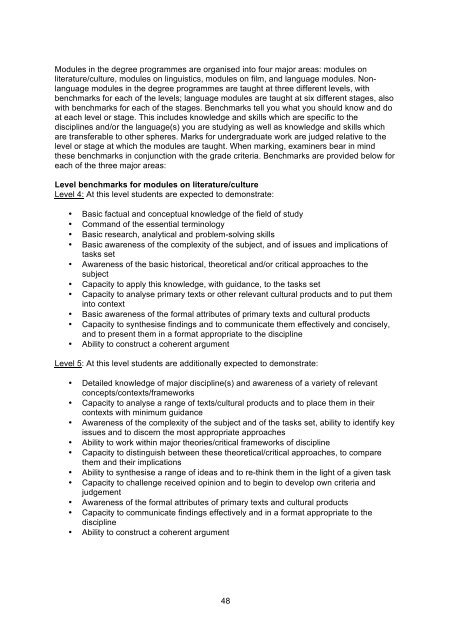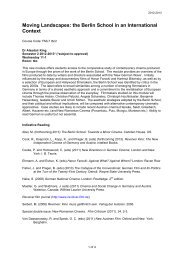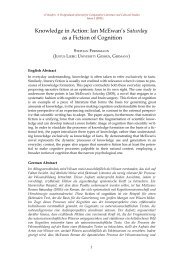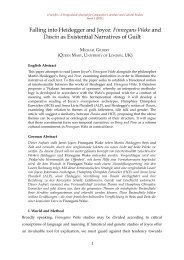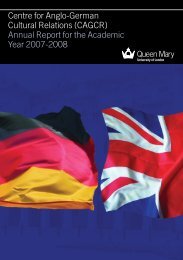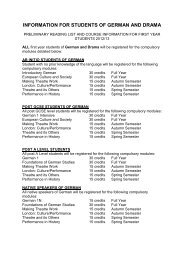Student Handbook - The School of Language, Linguistics and Film
Student Handbook - The School of Language, Linguistics and Film
Student Handbook - The School of Language, Linguistics and Film
Create successful ePaper yourself
Turn your PDF publications into a flip-book with our unique Google optimized e-Paper software.
Modules in the degree programmes are organised into four major areas: modules on<br />
literature/culture, modules on linguistics, modules on film, <strong>and</strong> language modules. Nonlanguage<br />
modules in the degree programmes are taught at three different levels, with<br />
benchmarks for each <strong>of</strong> the levels; language modules are taught at six different stages, also<br />
with benchmarks for each <strong>of</strong> the stages. Benchmarks tell you what you should know <strong>and</strong> do<br />
at each level or stage. This includes knowledge <strong>and</strong> skills which are specific to the<br />
disciplines <strong>and</strong>/or the language(s) you are studying as well as knowledge <strong>and</strong> skills which<br />
are transferable to other spheres. Marks for undergraduate work are judged relative to the<br />
level or stage at which the modules are taught. When marking, examiners bear in mind<br />
these benchmarks in conjunction with the grade criteria. Benchmarks are provided below for<br />
each <strong>of</strong> the three major areas:<br />
Level benchmarks for modules on literature/culture<br />
Level 4: At this level students are expected to demonstrate:<br />
• Basic factual <strong>and</strong> conceptual knowledge <strong>of</strong> the field <strong>of</strong> study<br />
• Comm<strong>and</strong> <strong>of</strong> the essential terminology<br />
• Basic research, analytical <strong>and</strong> problem-solving skills<br />
• Basic awareness <strong>of</strong> the complexity <strong>of</strong> the subject, <strong>and</strong> <strong>of</strong> issues <strong>and</strong> implications <strong>of</strong><br />
tasks set<br />
• Awareness <strong>of</strong> the basic historical, theoretical <strong>and</strong>/or critical approaches to the<br />
subject<br />
• Capacity to apply this knowledge, with guidance, to the tasks set<br />
• Capacity to analyse primary texts or other relevant cultural products <strong>and</strong> to put them<br />
into context<br />
• Basic awareness <strong>of</strong> the formal attributes <strong>of</strong> primary texts <strong>and</strong> cultural products<br />
• Capacity to synthesise findings <strong>and</strong> to communicate them effectively <strong>and</strong> concisely,<br />
<strong>and</strong> to present them in a format appropriate to the discipline<br />
• Ability to construct a coherent argument<br />
Level 5: At this level students are additionally expected to demonstrate:<br />
• Detailed knowledge <strong>of</strong> major discipline(s) <strong>and</strong> awareness <strong>of</strong> a variety <strong>of</strong> relevant<br />
concepts/contexts/frameworks<br />
• Capacity to analyse a range <strong>of</strong> texts/cultural products <strong>and</strong> to place them in their<br />
contexts with minimum guidance<br />
• Awareness <strong>of</strong> the complexity <strong>of</strong> the subject <strong>and</strong> <strong>of</strong> the tasks set, ability to identify key<br />
issues <strong>and</strong> to discern the most appropriate approaches<br />
• Ability to work within major theories/critical frameworks <strong>of</strong> discipline<br />
• Capacity to distinguish between these theoretical/critical approaches, to compare<br />
them <strong>and</strong> their implications<br />
• Ability to synthesise a range <strong>of</strong> ideas <strong>and</strong> to re-think them in the light <strong>of</strong> a given task<br />
• Capacity to challenge received opinion <strong>and</strong> to begin to develop own criteria <strong>and</strong><br />
judgement<br />
• Awareness <strong>of</strong> the formal attributes <strong>of</strong> primary texts <strong>and</strong> cultural products<br />
• Capacity to communicate findings effectively <strong>and</strong> in a format appropriate to the<br />
discipline<br />
• Ability to construct a coherent argument<br />
48


